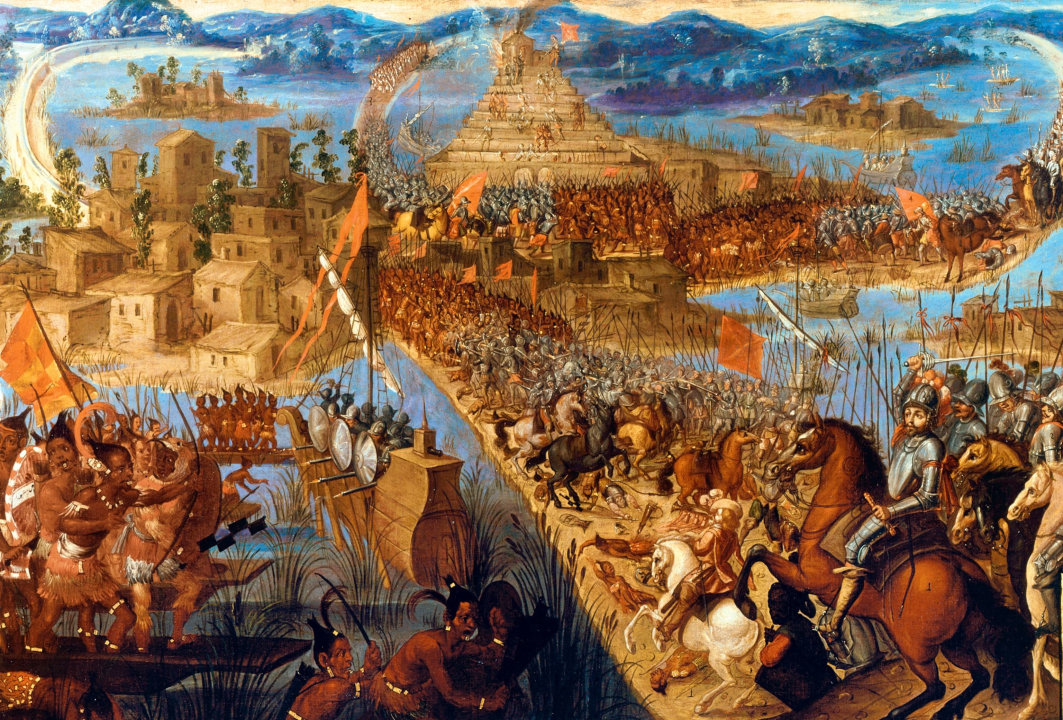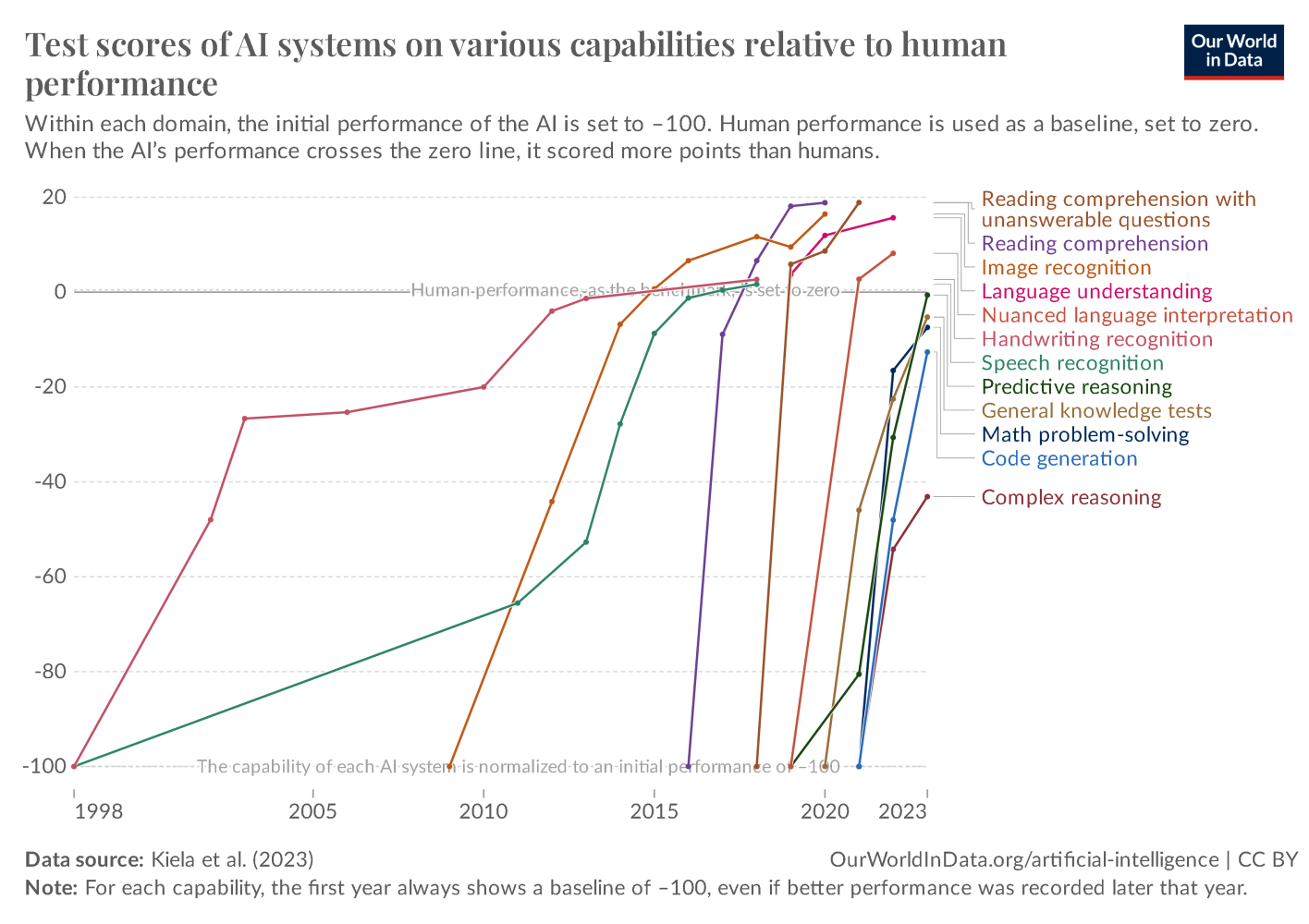The AI Revolution - Augmentation, Not Replacement

In the early 1500s, a handful of Spanish conquistadors toppled vast empires in the Americas: Cortes and about 500 Spaniards conquered the Aztec empire of several million; Pizarro and ~300 Spaniards conquered the Inca empire of several million. Their success wasn’t due to god-like power, but rather through technological superiority. Today, we stand at the precipice of a similar paradigm shift – not through conquest, but through artificial intelligence.
Recent weeks, I’ve noticed a dialogue surrounding Leopold Aschenbrenner’s Situational Awareness. While much focus has been on national security implications, I’d like to explore a more immediate concern: how AI is reshaping our workforce.
The AI Advantage
Our World in Data shows AI systems surpassing human performance in various domains at an exponential rate. This isn’t just about machines beating us at chess; it’s about redefining the very nature of work and human potential. However, Generative AI’s actual impact on the market remains under-documented. It’s unclear whether the perceived anxiety in the media reflects real productivity losses or gains. To truly understand this shift, we must look beyond media anxiety to frontline industry insights.

The freelance market, often a bellwether for economic shifts, offered surprising insights. Upwork reported a growth in sectors most susceptible to automation. While writing and translation declined, video production surged by 40%, and web/graphic design grew 8-10%. Counter-intuitively, the most “at-risk” occupations are thriving.
Why? Because AI isn’t replacing these roles – it’s augmenting them. Professionals can now deliver higher-quality work more efficiently. Generative AI’s text and image output itself lack intrinsic meaning but become valuable when expertly integrated into larger products or services. This efficiency extends across industries, with AI agents like Devin showing promise in automating complex software engineering tasks.
The Augmentation Effect
This is the key to understanding AI’s true impact: it’s not about replacement, but amplification. A single AI-augmented worker can now accomplish tasks that previously required entire teams. We’ve entered the AI era, economically proven at the industry’s forefront. While precise figures are lacking, the shifts are palpable – gradual integration and nuanced specialisation are consolidating into faster processes and higher productivity.
This is why I partly disagree with Acemoglu’s recent conservative estimates of AI’s economic impact, but align more with his older work on technological change. The real transformation will come from workers dramatically increasing their output and value - imagine £X workers doing £2X work, or even delivering £3X value. These shifts are already happening in the contingent work space, likely foreshadowing broader changes. While AI’s overall economic impact remains debated, I believe we’ll see a dual effect: initial displacement (of lower-value tasks) as AI automates certain functions, followed by reinstatement as new, higher-value jobs and tasks emerge.
Curation and Domain Expertise
In this new era, success hinges on curation – the ability to effectively integrate AI-generated outputs into cohesive, purpose-driven solutions. This requires not just technical skills, but deep domain understanding: designers must weave aesthetics and cultural insights into compelling visual narratives; developers need to architect complex systems and translate business needs into efficient, scalable solutions.
The true differentiator isn’t in merely using AI tools, but in applying fundamental domain expertise to contextualise AI outputs. This underscores a timeless truth: in a world of rapid technological change, a strong foundation in the fundamentals of your field is more crucial than ever.
References
-
📚 Situational Awareness by Leopold Aschenbrenner, ex-Superalignment team member at OpenAI. This 165-page manifesto predicts AI’s rapid development until 2027, potentially reaching AGI levels, based on physical compute scaling, algorithmic efficiency, and “unhobbling” of current AI models. This development could lead to AI capable of automating AI research itself, potentially triggering an intelligence explosion and dramatically accelerating scientific and technological progress.
-
🔍 Occupational, Industry, and Geographic Exposure to Artificial Intelligence by Edward Felton, Manav Raj, and Rob Seamans. Introduces the AI Occupational Exposure (AIOE) dataset, ranking industries and occupations based on their AI vulnerability.
-
📊 The Simple Macroeconomics of AI by Daron Acemoglu. Offers a conservative estimate of AI’s impact on productivity, challenging more optimistic projections from Goldman Sachs and McKinsey.
-
🔄 Automation and New Tasks: How Technology Displaces and Reinstates Labor by Acemoglu and Restrepo. Presents a framework for understanding how technological changes affect labour demand.
-
💼 The Impact of AI on the Job Market: Key Insights by Upwork Research Institute. Reveals generative AI’s asymmetric impact on the freelance market, benefiting high-skill workers while challenging those in low-value tasks.
-
📈 Our World in Data: Artificial Intelligence visualises AI systems’ performance relative to humans across various capabilities.
-
🤖 Introducing Devin: the first AI software engineer A video demonstrating Devin by Cognition, an AI agent showing promising capabilities in automating complex software engineering tasks.
Enjoy Reading This Article?
Here are some more articles you might like to read next: